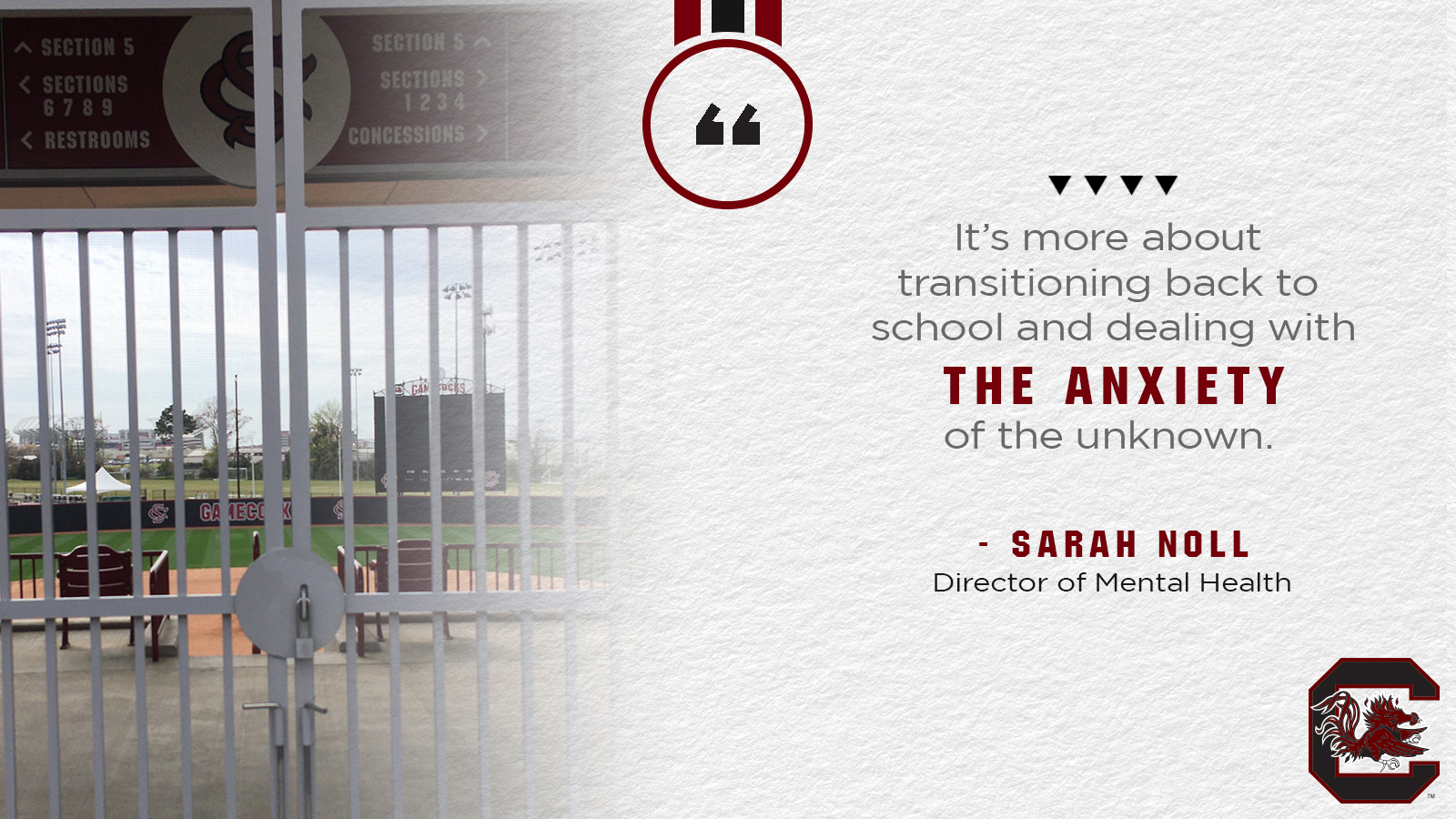
Gamecocks Reminded About Available Mental Health Services
With all the uncertainty for everyday life due to the COVID-19 pandemic, the Gamecock Sports Science Network wants to remind student-athletes about the mental health services available to them. Sarah Noll, the Athletics Department’s Director of Mental Health, said there are a number of reasons why more people are reaching out for assistance.
“I would say the for the majority of the people who are reaching out now, it’s more about transitioning back to school and dealing with the anxiety of the unknown,” Noll said. “They’re not sure what to expect. A lot of athletes have had to quarantine prior to reporting to school and that isolation can be very difficult. I also believe that more students are reaching out because we are more visible within the department, something that as a team we have tried to accomplish in my two plus years here. We are also seeing student athletes re-engaging in treatment now that they are back on campus.
“I feel like our services are being utilized more. I feel like I’m getting more referrals, but we are also reaching out to more students and be more visible. We are making sure they have the resources they need, especially if they were by themselves, because that’s hard.”
Student-athletes have access to a wide variety of mental health services and professionals through the Gamecock Sports Science Network, including a psychiatrist, clinical psychologists, and therapists.
“We offer medication management with (psychiatrist and Wellness Director) Dr. (Tim) Malone, individual counseling where we address concerns ranging from recent loss, anxiety, depression, other mood disorders, and performance anxiety,” Noll said. “We also offer some substance abuse help.
“We’re also offering several virtual groups this year. One group titled ‘Your Next Game,’ will focus on exactly that; what happens next if your season gets canceled or changed in some way. It’s a space to be able to process what’s next.
“Another group will focus on mental skills to make sure that you are able to perform at your best, no matter what happens. A third group will be a process group where the topics will change based on whatever the student-athletes want to discuss that week. The last group is like a book club, but it’s a movie club where we can watch a movie in our own separate spaces and then come together and have a discussion about the movie. All of the movies will be focused around athlete mental health.”
“Being resilient and being able to accept that change and adapt to that change is what is going to help you manage that.”
Noll said it’s important to be proactive and remind the student-athletes of what is available.

Dr. Malone
“That’s been a push since I arrived here,” Noll said. “We get in front of the sports when they get here at the beginning of the year to tell them who we are and tell them about the services we are offering.”
Most of the services currently being offered are virtual meetings.
“There is minimal in-person counseling being done right now,” Noll explained. “If there is a specific need for that, we’ll do it, or if there is some psychological testing that cannot be done virtually. For the most part, we’re trying to stay virtual.”
The counselors and doctors also want to help erase the stigma some associate in seeking mental/psychological help, and in some ways, the virtual sessions help in that area.
“I actually think that it has been helpful in the sense that you don’t have to come into the office and walk in front of people,” Noll said. “You drop that barrier of being seen going into a therapist’s office. It also helps with people who don’t have transportation or don’t have the time in their already tight schedule to travel from their dorm or campus and drive to their next place after their appointment.
“The barrier to telehealth is that you don’t have that real person-to-person connection. Often times, that can be very helpful in a therapeutic setting. It’s one thing to see the person online, and that’s great, but there are some situations where it’s nice to be physically present.”
The department plans to keep most sessions virtual unless there is a specific need to meet in-person, which also allows them to make sure they can keep the whole staff healthy.
Some student-athletes are dealing with the anxiety of missing a season or wondering if their season will be played, and learning coping skills is a key for that aspect of mental health.
“The biggest thing is that you have to get comfortable with not knowing and having uncertainty,” Noll said. “You have to be flexible knowing that things could change at any moment. Being resilient and being able to accept that change and adapt to that change is what is going to help you manage that. You don’t have to like it. It just means you have the skills to say, what is plan B?”
Noll encourages the student-athletes to look after themselves and their teammates.
“If you’re noticing changes, reach out and seek help whether it’s through our department or the resources that are available to every student on campus. I just want people to get the help they need.”












